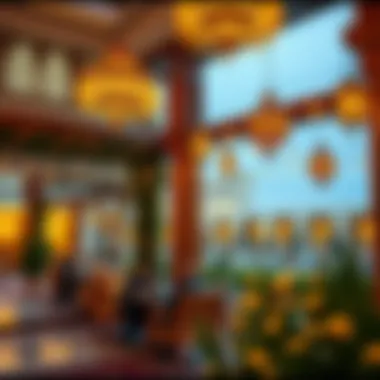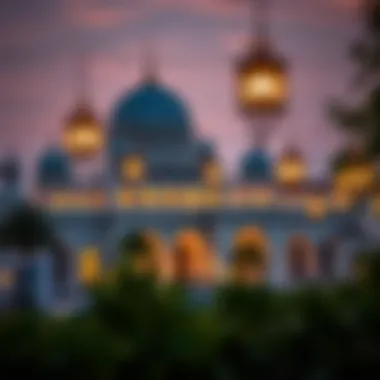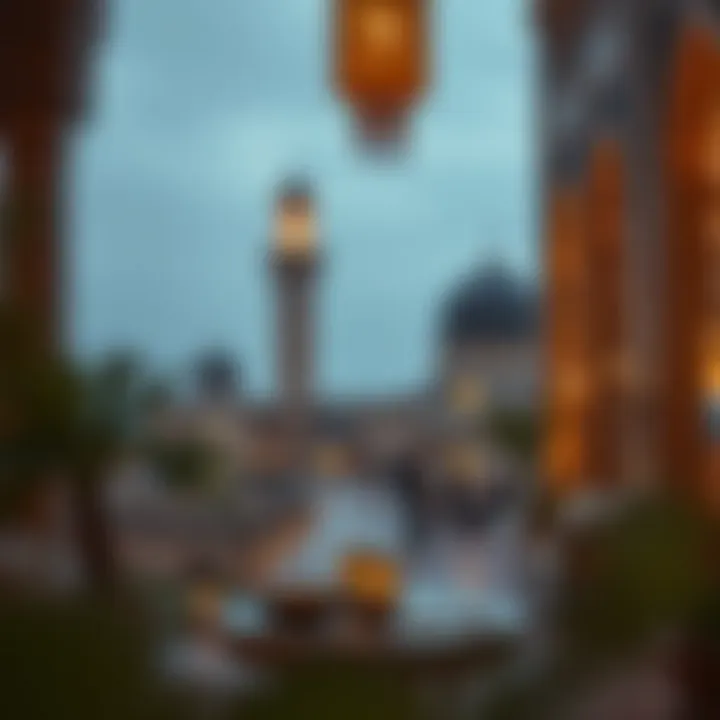Iftar Time in Ramadan 2023: Cultural and Social Insights


Intro
Ramadan is more than just a month of fasting; it’s a period that symbolizes community, spirituality, and cultural richness. In places like Dubai, where tradition encounters modernity, the significance of iftar time transforms into a unique blend of age-old customs and contemporary practices. As the sun dips below the horizon, families and friends gather to share meals that not only fulfill the body's needs but also strengthen communal bonds.
The act of breaking fast, known as iftar, extends beyond nourishment. It encompasses a tapestry of experiences, from the types of food served to the settings where these meals are enjoyed. This article delves into the multifaceted nature of iftar time during Ramadan 2023, providing insights that are pertinent for various stakeholders, especially those navigating the bustling real estate and hospitality landscapes of Dubai.
Notably, the choice of dining experiences during this period is shifting. Many now seek meals that resonate with their cultural roots while embracing modern culinary trends. This evolution sparks implications for businesses and investors in the hospitality sector, particularly in a vibrant city like Dubai, where the intersection of flavor and festivity becomes increasingly significant.
In exploring these dynamics, we will not only highlight current trends in Dubai's market but also engage with the broader strategies that effect meaningful investments in the region. %s
As we unfold the narrative of iftar time, we invite you to witness how this beautiful occasion shapes down-to-earth interactions and grand commercial undertakings alike. The quest to understand this unique blend of the sacred and the practical marks the journey ahead.
Understanding Iftar: Definition and Importance
Iftar, the meal that breaks the daily fast during Ramadan, serves not just as a sundown treat but as a crucial moment imbued with spiritual and communal significance. The act of fasting culminates in iftar, where family, friends, and communities unite to share food and reflect on their experiences over the day. Understanding iftar goes deeper than merely waiting for the call to prayer at sunset; it's in the essence of practices, choices, and connections made around the dining table that are worth exploring.
Historical Context
The tradition of iftar has roots woven into the very fabric of Islamic history. Originating from the teachings of the Prophet Muhammad, the practice of fasting during Ramadan is believed to be one that promotes self-discipline, empathy for the less fortunate, and gratitude. Historically, iftar has shifted in form and context through various cultures, illustrating how food plays a role in societal customs. In the early years of Islam, meals were often simple and modest, often shared among a few individuals. As time wore on and the significance of Ramadan grew, especially in diverse regions, iftar began to evolve, depicting local customs and seasonal foods.
The simple dates and water that were once staples have now transformed into elaborate buffets or family gatherings with an array of dishes. Such transformations cannot be overlooked, as they tell tales of travel, adaptation, and cultural exchange that makes iftar a rich tapestry of culinary tradition.
Cultural Significance in Ramadan
In today’s globalized world, the cultural impact of iftar remains profound, especially in places like Dubai, which boasts a melting pot of traditions and backgrounds. Here, the breaking of the fast is not just a moment to satiate hunger; it symbolizes unity, compassion, and shared experiences. Families often gather not just for the meal itself, but for the bonds that are strengthened during this time.
This spirit is echoed in larger community settings, where local mosques and community centers often host iftar events open to all. Here are some cultural aspects of iftar:
- Inclusivity: Events are often open to everyone, transcending religious and cultural boundaries. People from various faiths engage in iftar gatherings, which foster understanding and acceptance.
- Charity: Many choose to give back during Ramadan by providing meals for those in need, showcasing the communal spirit inherent in iftar.
- Rituals and Traditions: Families pass down recipes and specific dishes, which not only serve as culinary delights but also as a way to connect with heritage.
"Iftar is more than just a meal; it's an occasion to gather, reflect, and strengthen relationships. It's where the past, present, and future of familial ties neatly converge."
As we look at the practices surrounding iftar in 2023, it is vital to acknowledge its historical evolution while appreciating its cultural resonance in contemporary society. The interplay of tradition and modernity creates a unique atmosphere every evening in Ramadan, shaping how individuals and communities engage with this cherished moment.
Ramadan 2023: Key Dates and Observations
Understanding the key dates and observations of Ramadan is crucial in navigating the month’s significance, especially in a city like Dubai. This segment will shed light on pivotal dates, the cultural implications of these observances, and how they influence the lives of residents and visitors alike during this blessed period. Ramadan isn’t just a time for fasting; it’s a chance for reflection, community cohesion, and personal growth. Knowing when it begins and ends can significantly enhance the spiritual experience as well as the practical planning surrounding daily activities, from meals to community gatherings.
Start and End Dates
Ramadan in 2023 is set to commence in the evening on March 23 and will conclude in the evening on April 21, based on the lunar calendar. The exact starting and ending times may fluctuate slightly depending on the sighting of the moon, a tradition that connects the community to centuries of Islamic practice. The significance of these dates runs deeper than mere schedule; they mark a period of introspection, discipline, and unity among Muslims worldwide.
- March 23: The first day of fasting begins. The anticipation builds as families prepare for this month-long observance, shopping for provisions and setting up their homes for gatherings.
- April 21: Eid al-Fitr, the festival of breaking the fast, is celebrated. This day is characterized by feasting, giving, and connecting with loved ones, ending the month on a high note.
The joy of anticipation for the start of Ramadan, coupled with the celebrations of Eid, heightens the emotional landscape for many. The forethought applied to these days shapes not only individual experiences but also collective ones, setting a rhythm to community life.
Significance of the Crescent Moon Sighting
The sighting of the crescent moon is of immense importance in determining the beginning and the end of Ramadan. While modern technology offers methods for predicting lunar phases, the traditional practice of visual confirmation remains integral to Islamic tradition. This sighting takes on social dimensions, as communities unite to witness the moon together, often resulting in gatherings that fuse spirituality with community bonding.
"The crescent moon sighting is a moment filled with hope and new beginnings, linking the community to the first fast observed by the Prophet Muhammad."
It’s not merely about the moon itself; there are deeper meanings tied to it. The act of sighting brings families and friends together, promoting discussions about faith and tradition, echoing the communal aspects of Ramadan.
- Cultural Heritage: This practice is steeped in centuries-old traditions and customs, maintaining a continuity of faith that ties generations together.
- Community Engagement: Many mosques and community centers organize events around the sighting, allowing people to come together and celebrate their shared cultural identity.
- Symbol of Renewal: Just as the moon renews itself each month, it signifies a time for personal growth and spiritual renewal for individuals partaking in the fast.
Iftar Timing in Dubai: Schedule
Iftar in Dubai during Ramadan 2023 is not just about breaking your fast; it encapsulates a unique blend of time, tradition, and community spirit. In a city that's always buzzing, the specific timing of iftar becomes a crucial element for families, friends, and even businesses. Understanding these timings allows everyone to synchronize their schedules, ensuring that the experience of sharing a meal becomes an enjoyable and meaningful one.
The importance of iftar timing goes beyond the clock. It shapes the day's rhythm and influences social gatherings. For instance, knowing when to break fast aids in planning events, whether it's a family dinner or a large community feast. Furthermore, businesses in Dubai's hospitality sector often adjust their service times to cater to iftar, highlighting how changes in timing can affect economic activities.


Daily Timing Adjustments
As the month of Ramadan progresses, the timing for iftar changes slightly each day. This variation is primarily due to the shifting position of the sun, which affects sunset times in Dubai. In 2023, for example, the first iftar may be around 6:28 PM, while by the end of Ramadan, it could be closer to 6:40 PM. This daily adjustment requires attention, particularly for those organizing meals or events.
Getting the iftar timing right is a communal endeavor. Mosques often announce the time just before sunset, and families have their own traditions surrounding this moment. In many cases, folks can be seen eagerly waiting to break their fast with a date or sip of water right at sunset. For each day, families might have planned meals that reflect the sacredness of the occasion, often including traditions passed down through generations.
Factors Influencing Local Timing Variances
Several factors can lead to differences in iftar timings across various locations within Dubai. These include geographical positioning, the presence of tall buildings, and local customs.
- Geographical Positioning: Dubai's proximity to the equator means it experiences minimal daylight variation throughout the year, but smaller geographical nuances can still affect iftar.
- Urban Landscape: Tall buildings in certain neighborhoods can cast shadows long before sunset, potentially leading to an earlier or later iftar experience. For example, in areas like Burj Khalifa or Dubai Marina, the skyline might cause the observance of iftar to be slightly adjusted.
- Cultural Practices: Different communities within Dubai sometimes have unique customs regarding when they gather for iftar. For instance, expatriate communities might align with their home countries’ practices or might adopt local approaches, creating a melting pot of traditions.
Understanding these variances helps folks plan their iftar meals or gatherings more effectively, fostering inclusivity across diverse communities.
"The break of fast is not just the end of a day of fasting; it’s a celebration of togetherness that transcends cultural boundaries."
Overall, Iftar timings in Dubai during 2023 not only set a timetable for meals but also play a vital role in reinforcing social bonds and respecting communal customs. Whether for personal observance or contributing to the hospitality scene, being aware of these specifics enhances the overall Ramadan experience.
Traditional Iftar Foods: A Culinary Perspective
The culinary aspect of Iftar holds a significant place during Ramadan, revealing not just personal tastes but also deeper cultural narratives. Sharing food brings families and communities together, making it essential to understand what’s on the table during this holy month. This section delves into various foods and beverages typically consumed during Iftar, the importance of dates, and the modern reinterpretations of traditional dishes that reflect evolving tastes and lifestyles.
Common Foods and Beverages
Iftar feasts vary widely among communities yet retain a common essence of celebration and generosity. Traditional foods often include:
- Samosas: These savory pastries stuffed with spiced potatoes or meat are a beloved choice, especially in Arab and South Asian households. They can be deep-fried or baked, making them versatile for various dietary preferences.
- Haleem: A rich porridge made from wheat, barley, lentils, and meat. This dish is particularly popular in Gulf countries and South Asia, representing a filling option after a long day of fasting.
- Shorba: This warm soup, made with lentils or chicken, is known for its soothing qualities, helping to ease the stomach into digesting after a long fast.
- Fruits: Fresh fruits, often in the form of salad or simply cut and served, provide hydration and nourishment. Watermelon and citrus varieties are favorites due to their refreshing nature.
The aroma from these dishes wafts through homes, inviting family and friends to gather around the table. It’s all about community, shared experiences, and embracing the feast after sunset.
Drinks like tamr hindi (a refreshing tamarind drink) and rose water lemonade add sweetness and flavor to the Iftar table, enhancing the overall experience of breaking the fast.
The Role of Dates in Iftar
Dates are not merely a sweet treat; they hold deep historical and nutritional significance during Ramadan. The tradition of breaking the fast with dates stems from prophetic traditions and continues to be observed due to their numerous benefits:
- Nutritional Powerhouse: Dates are rich in fiber, vitamins, and minerals. They provide a quick source of energy, which is a crucial benefit after a day of fasting.
- Symbolism: The act of consuming dates connects individuals to centuries of tradition, reinforcing the communal and historical aspects of Ramadan.
- Versatility: Beyond sharing them plain, dates can be stuffed with nuts or wrapped in bacon and baked, showcasing a fusion of flavors that cater to diverse palates.
Consuming dates is more than just a dietary choice; it’s a cherished ritual that represents warmth and hospitality.
Modern Twists on Traditional Dishes
As culinary preferences shift, especially in cosmopolitan areas like Dubai, there's a growing trend towards reinventing traditional dishes. Chefs and home cooks alike are experimenting with flavors, styles, and techniques, leading to several notable innovations:
- Curry Samosas: While traditional samosas are usually filled with potatoes or meat, introducing curry spices or even fusion fillings like cheese can revamp this classic dish into something fresh and exciting.
- Vegan Haleem: In response to the increasing demand for plant-based diets, a vegan version of haleem made with lentils, spices, and vegetable broth has emerged, catering to a broader audience without sacrificing flavor.
- Modern Date Desserts: Desserts like date-based cakes, brownies, or energy bites, which combine traditional ingredients with contemporary baking, align perfectly with modern health trends.
The evolving nature of Iftar foods reflects the changing demographics and tastes within communities, making Ramadan a living cultural tapestry where culinary innovation and tradition coexist harmoniously.
Social Aspects of Iftar: Community and Family
The essence of iftar extends beyond just breaking the fast; it encapsulates the heart of community and family bonds, particularly during Ramadan. This period is not merely a time for personal reflection and religious observance; it is an opportunity to foster connection, share experiences, and strengthen the fabric of society. The social aspects of iftar are vital, as they enhance the overall experience of Ramadan and underline its significance.
Gathering of Family and Friends
Iftar symbolizes a reunion, an annual invitation to gather around the dinner table where loved ones come together. Families often spend long hours preparing meals together, picking fresh ingredients from local markets, or savoring traditional recipes handed down through generations. This communal cooking experience is just as integral to the meal as the food itself.
In many homes, the call to prayer resonates in the background as family members, both near and far, pause their daily activities to participate in this special moment. The atmosphere is charged with anticipation, laughter, and love, creating bonds that can withstand any challenges.
Sharing a meal during iftar is more than just an act of eating; it is about sharing stories, giving support, and reliving childhood memories. It reinforces not just familial ties but also the social network within neighborhoods.
- Boosting Social Cohesion: These gatherings serve to unify individuals, encouraging diverse cultures and backgrounds to celebrate together.
- Empathy and Support: During iftar, families often remember those less fortunate, leading to charitable acts that further bind the community together.
Community Events and Charitable Initiatives
In many Dubai neighborhoods, the spirit of iftar goes beyond the household. Community events flourish, welcoming everyone to share in the feast. Public iftar gatherings held in parks, community centers, or mosques provide a festive atmosphere that embraces all residents. These initiatives not only promote kindness and generosity but also create a sense of belonging.


"The act of bringing people together is profound; it creates shared memories that last lifetime."
Charity during Ramadan becomes a notable focal point, significantly influencing local culture. Many organizations and community groups orchestrate food drives and charitable events aimed at providing iftar meals to those who cannot afford them. These initiatives offer opportunities for individuals to volunteer their time and resources, fostering connection within the community.
Some notable aspects include:
- Collaborative Efforts: Local businesses often contribute to these events, offering to sponsor meals or provide supplies.
- Cultural Exchanges: Wares, foods, and customs from various communities create a vibrant tapestry of traditions, enriching the experience of iftar for all involved.
By participating in such gatherings, community members not only enjoy a meal but also build relationships, share cultural insights, and promote inclusivity, thus laying the groundwork for a more cohesive society.
The Economic Impact of Iftar
Iftar, the meal to break the fast during Ramadan, carries much more weight than merely being a routine of daily life. It's a moment of community bonding, reflection, and nourishment after a long day of fasting. Beyond its spiritual and social implications, the period surrounding iftar significantly impacts the economy, particularly in bustling cities like Dubai.
Hospitality Industry Trends
The hospitality sector sees a noticeable uptick in activity during Ramadan, especially during iftar hours. Restaurants and hotels ramp up their offerings, creating elaborate menus that cater to the preferences of families and individuals partaking in this time-honored tradition.
- Special Iftar Buffets: Many establishments curate special iftar buffets to attract diners, combining traditional and contemporary culinary delights. Not only does this showcase culinary creativity, but it also enhances the dining experience, drawing in larger crowds.
- Takeaway Options: With an increasing number of people preferring to eat at home or have meals delivered, many restaurants adapt by providing takeaway iftar options. This flexibility caters to changing consumer lifestyles and helps restaurants capture a broader market.
- Promotional Campaigns: Ramadan periods are ripe for promotional deals, enticing customers with discounts or bundled meal offers, creating a win-win for both consumers and businesses.
Furthermore, hotels often see a surge in tourists eager to experience local customs. They host community iftar events, with some serving thousands of meals in collaboration with local charities, enhancing both their brand and community reputation.
"The increase in patronage and the creativity displayed during iftar sets the stage for not just economic growth but social dialogue that transcends borders."
Potential for Real Estate Market Growth
The economic ramifications of iftar span beyond dining establishments. An indirect yet impactful aspect is its influence on the real estate market. As families and communities gather, the demand for suitable housing options near dining venues tends to increase.
- Community Developments: There is an uptick in interest for residences that provide easy access to restaurants or community gathering venues. Developers are taking note, investing in mixed-use properties that offer residential, dining, and retail prospects in close proximity.
- Short-term Rentals: A rise in short-term rentals, especially during Ramadan, provides homeowners with an additional income source. With many expatriates and tourists drawn to Dubai for its Ramadan celebrations, property owners capitalize on this influx.
- Infrastructure Improvements: Increased foot traffic ensures that local infrastructure receives attention as cities adapt to manage larger crowds. This can lead to enhanced public amenities, benefiting residential properties nearby.
Moreover, the cultural connotation associated with sharing meals during iftar enhances community bonds, often attracting families to relocate to neighborhoods recognized for their vibrant iftar scenes. This translates into higher demand for homes in those areas and bolsters construction activities.
Through observing these industry trends, it becomes evident that the economic impact of iftar extends beyond the act of dining, making it crucial, not just for spiritual observance, but also for the economic fabric of urban settings such as Dubai.
Challenges Surrounding Iftar Practices
Addressing the challenges surrounding iftar practices is crucial in understanding the societal implications during Ramadan, particularly in vibrant locales like Dubai. With the fast pace of urban life, these challenges can influence not just individual experiences but also community dynamics and economic activities. Grasping these obstacles helps shed light on how communities can adapt to changing social landscapes while maintaining the essence of Ramadan.
Food Waste Considerations
Food waste during iftar is a pressing issue that deserves attention. Each evening, families gather to break their fast, often preparing a variety of dishes. The tradition is rich and extends to an array of foods meant to represent abundance and hospitality. However, with the enthusiasm surrounding these communal meals, there often comes a hefty downside: surplus food that goes uneaten. According to studies, around 30% of prepared food during iftar is wasted—a statistic that highlights a significant concern not only from an ethical standpoint but also from an economic one.
Benefits of Addressing Food Waste:
- Environmental Impact: Reducing food waste can lower methane emissions from landfills, which are significant contributors to climate change.
- Community Support: Redirecting surplus food to local charities can aid in addressing food insecurity within the community, turning an issue into a potential solution.
Residents can engage in practices such as planning meals carefully and sharing excess food with neighbors. Some organizations in Dubai are stepping up, creating initiatives that focus on educational campaigns around food preparation, storage, and waste reduction.
"Wasting food is like wasting the love and effort that went into preparing it."
Logistical Challenges in Urban Areas
Urban areas tend to have unique challenges concerning iftar preparations. Traffic congestion and limited public spaces can strain the logistics of communal meals. Consider a family that decides to host an iftar: when you have multiple households coming together, coordinating schedules, food stations, and seating can become quite a cumbersome task.
Factors at Play:
- Traffic Congestion: As people rush to get home for iftar, the streets fill up quickly. This can delay communal gatherings, making it challenging for families and friends to meet up.
- Space Constraints: In densely populated areas, finding suitable venues becomes a headache. Not everyone has the luxury of space at home to accommodate extended family or friends.
- Distribution Challenges: For charitable iftar events, aligning enough volunteers to prepare and distribute food can be a logistical nightmare, especially at peak hours.
To tackle these issues, innovation has a role to play. Some organizations are employing technology to map out traffic patterns and streamline donations of food to wider areas. Mobile apps that connect hosts with local attendees can also enhance participation while ensuring that logistics are handled more smoothly.
In summary, while iftar remains a time of connection and community, recognizing the challenges linked to food waste and logistical constraints is essential for fostering efficient practices and embracing the spirit of Ramadan.


Iftar and Personal Well-Being
Iftar, which marks the end of the daily fast during Ramadan, serves not just as a time to break one's fast but also shapes various aspects of personal well-being. With the physical and spiritual demands that fasting imposes, understanding the relationship between iftar and personal well-being is crucial. It can foster a better quality of life not only through nutritional intake but also through social and emotional connections.
Health Considerations During Ramadan
The health implications surrounding iftar are multifaceted. Breaking the fast is often a moment of rejoicing, but one must approach it with mindfulness. The common practice of loading up on rich foods can lead to digestive distress if not managed properly. Instead, incorporating a variety of nutrients is key, ensuring that the meal includes proteins, carbohydrates, and fats in moderation.
Key considerations include:
- Hydration: Drinking ample water is essential to compensate for the hours of fasting. A mixture of plain water, herbal teas, and hydrating foods like watermelon can prevent dehydration.
- Gradual Break: Starting with dates and water is traditionally favored. This gentle approach can help the body adjust, preventing shock to the digestive system.
- Balanced Meals: Including vegetables and lean meats in the iftar meal can contribute to overall well-being. Avoiding overly greasy or spicy foods may help circumvent gastrointestinal discomfort.
While many may see iftar as an opportunity to indulge, it is important to remember moderation and thoughtfulness around food choices can enhance both physical health and energy levels, facilitating a smoother fasting experience in the days to come.
Mental Well-Being During Fasting
Beyond the physical realm, fasting during Ramadan has profound impacts on mental health. The practice encourages a moment for reflection and self-assessment, boosting emotional resilience and mindfulness. Iftar, in this regard, acts as a communal event that fosters bonds among families and communities.
Benefits of focusing on mental well-being include:
- Community Connection: Sharing iftar with friends and family creates a sense of belonging, which can be particularly uplifting amidst the challenges of daily life.
- Reflection Time: The act of fasting itself allows individuals to engage in self-reflection, promoting a deeper understanding of one’s emotions and thoughts.
- Stress Management: Engaging in spiritual practices such as prayer and meditation before iftar can help manage stress levels, providing a sense of tranquility.
"The communal aspects of iftar can uplift the spirit, turning a simple meal into an experience that enriches emotional well-being."
Incorporating both nutritious foods and social connections into iftar not only enhances personal well-being during Ramadan but also sets a positive course for overall health and happiness long after the month has passed.
Future Trends in Iftar Practices
As the world evolves, so too do cultural practices, and iftar during Ramadan is no exception. Understanding the future trends in iftar practices is crucial not just for participants but also for various stakeholders, including investors and businesses in Dubai. The evolution of culinary habits and the integration of technology can significantly shape how individuals and communities experience this sacred time. By closely examining these trends, stakeholders can capitalize on opportunities that align with the community's values while addressing emerging needs.
Emerging Dining Concepts
The landscape of dining during iftar is slowly but surely undergoing a transformation. With an influx of diverse populations and changing tastes, new dining concepts are emerging that reflect a fusion of traditional and modern influences.
- Pop-Up Iftar Events: These short-term dining experiences allow chefs to showcase innovative dishes that marry traditional recipes with contemporary culinary techniques. They not only create excitement but also foster a communal spirit among attendees.
- Health-Conscious Menus: An increasing focus on health is steering restaurants to offer iftar menus that are lower in calories, sugar, and fat. Diners are becoming more conscious of their meal choices, prompting venues to adapt. This trend is significant for investors looking to tap into the wellness market.
- Global Influences: Chefs are now bringing flavors from all around the globe to their iftar tables. Think sushi-inspired samosas or Mediterranean mezze paired with traditional Arabic dishes. This culinary cross-pollination creates a richer experience for guests and encourages cultural exchange.
Adopting these innovative dining concepts not only enriches the iftar experience but also positions restaurants and food businesses as trend leaders in the hospitality industry.
Technology's Role in Iftar Planning
Technology has become a cornerstone in modern life, and it is no different when it comes to planning for iftar. Here are a few ways technology is shifting how people engage with this important meal:
- Mobile Applications: Platforms like MealTracker or Iftar Timing apps help individuals determine when to break their fast with notifications tailored to their local timings. These tools enhance the personal connection to the daily ritual of iftar.
- Online Ordering and Delivery Services: The rise of apps like Talabat and Zomato means that families can now order iftar meals from local restaurants, offering convenience without sacrificing quality. This can be especially beneficial for busy families or those unable to prepare meals themselves.
- Virtual Iftar Gatherings: With recent global events, virtual connections have become popular. Online platforms allow families and friends separated by distance to join together for a virtual iftar, ensuring they maintain communal ties. Utilizing video conferencing tools enriches the experience even when physical presence isn't possible.
Understanding future trends in iftar is not merely academic; it has practical implications that can lead to significant opportunities for businesses looking to thrive during Ramadan.
For those interested in digging deeper into such evolving trends, check resources such as Wikipedia or articles on Britannica, which provide valuable insights into the cultural context of Ramadan and its practices.
Closure: The Enduring Relevance of Iftar
Iftar is not just a meal; it represents a bridge between the spiritual and the communal aspects of Ramadan. The importance of iftar is woven into the fabric of this holy month, serving both as nourishment for the body and as a significant ritual that highlights shared beliefs and traditions. As we dissect the lasting implications of iftar, we discover its pivotal role in fostering community ties and enhancing personal reflection.
Reflection on Communal and Spiritual Values
Iftar gatherings echo the essence of togetherness. Families, friends, and even colleagues gather at sunset to break fast together, transforming a simple meal into an experience rich in spiritual significance. This social practice emphasizes generosity, as it encourages sharing not only food but also moments of joy and gratitude.
- Bonds are Strengthened: The act of breaking fast side by side fosters relationships and cultivates new ones. Remember that old saying, “the more, the merrier?” In the context of iftar, this rings truer than ever. Community members often come together in homes or communal spaces to share a meal, illustrating the harmony found in diversity.
- Spiritual Reflection: Beyond the communal dynamics, iftar provides individuals with a chance for introspection. The daily routine becomes a holistic experience, where moments of silence are welcomed, letting thoughts flow and allowing both gratitude and humility to settle in.
This interplay of social and spiritual elements demonstrates that iftar is indeed a cornerstone of Ramadan, shaping not only individual identities but also cultivating a broader sense of belonging.
Implications for Dubai's Future
As Dubai continues to grow and evolve, the implications of iftar stretch far beyond the kitchen table. The city’s multifaceted identity, blending tradition with modernity, is palpable during the month of Ramadan.
- Cultural Tourism Growth: As more tourists visit during Ramadan, iftar has become a focal point for the hospitality sector. Restaurants are increasingly offering special iftar menus that showcase a variety of cuisines, attracting locals and tourists alike. This trend indicates a significant opportunity for investment in the hospitality industry, anticipating a surge in demand for both traditional and modern dining experiences.
- Real Estate Development: With the increased demand for spaces that accommodate communal gatherings during iftar, we can also expect trends in real estate development. Properties with large communal dining areas could see growth, responding to the societal desire for accessibility to such cultural experiences.
“As Dubai thrives as a hub of cultural exchange, iftar stands as a testament to unity and resilience, shaping not just the social landscape but also the economy.”







